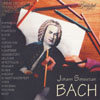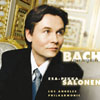Bach Transcriptions
A world where demigods and fireside philosophers hold court – regal, comforting and occasionally uplifting. Sony scores highest for sound, Biddulph for the burning conviction of its performances
View record and artist detailsRecord and Artist Details
Composer or Director: Johann Sebastian Bach
Label: Biddulph
Magazine Review Date: /2000
Media Format: CD or Download
Media Runtime: 160
Mastering:
ADD
Catalogue Number: BID 83069/70

Tracks:
| Composition | Artist Credit |
|---|---|
| Toccata and Fugue |
Johann Sebastian Bach, Composer
Alois Melichar, Conductor Berlin Philharmonic Orchestra Johann Sebastian Bach, Composer |
| (6) Suites (Sonatas) for Cello, Movement: No. 6 in D, BWV1012 |
Johann Sebastian Bach, Composer
Johann Sebastian Bach, Composer New York National Symphony Orchestra Walter Damrosch, Conductor |
| Preludes and Fugues, Movement: Prelude and Fugue in E flat, BWV552 (from Clavier-I) |
Johann Sebastian Bach, Composer
Chicago Symphony Orchestra Frederick Stock, Conductor Johann Sebastian Bach, Composer |
| Cantata No. 156, 'Ich steh mit einem Fuss im Grabe, Movement: Sinfonia |
Johann Sebastian Bach, Composer
Johann Sebastian Bach, Composer Leopold Stokowski, Conductor NBC Symphony Orchestra |
| Preludes and Fugues, Movement: Prelude (Fantasia) and Fugue in G minor, BWV542 |
Johann Sebastian Bach, Composer
Dimitri Mitropoulos, Conductor Johann Sebastian Bach, Composer Minneapolis Symphony Orchestra |
| St Matthew Passion, Movement: Herzliebster Jesu |
Johann Sebastian Bach, Composer
Eugene Ormandy, Conductor Johann Sebastian Bach, Composer Philadelphia Orchestra |
| Fugue |
Johann Sebastian Bach, Composer
Fritz Reiner, Conductor Johann Sebastian Bach, Composer Pittsburgh Symphony Orchestra |
| (3) Sonatas and 3 Partitas, Movement: Partita No. 3 in E, BWV1006 |
Johann Sebastian Bach, Composer
Boston Symphony Orchestra Johann Sebastian Bach, Composer Serge Koussevitzky, Conductor |
| Orgel-Büchlein, Movement: In dir ist Freude, BWV615 |
Johann Sebastian Bach, Composer
EIAR Orchestra Johann Sebastian Bach, Composer Vittorio Gui, Conductor |
| Orgel-Büchlein, Movement: O Mensch, bewein' dein' Sünde gross, BWV622 |
Johann Sebastian Bach, Composer
EIAR Orchestra Johann Sebastian Bach, Composer Vittorio Gui, Conductor |
| Passacaglia and Fugue |
Johann Sebastian Bach, Composer
Arturo Toscanini, Conductor Johann Sebastian Bach, Composer NBC Symphony Orchestra |
| Concerto in the Italian style, 'Italian Concerto' |
Johann Sebastian Bach, Composer
Berlin Philharmonic Orchestra Hans Schmidt-Isserstedt, Conductor Johann Sebastian Bach, Composer |
| Orgel-Büchlein, Movement: Num komm' der Heiden Heiland, BWV599 |
Johann Sebastian Bach, Composer
Johann Sebastian Bach, Composer Otto Klemperer, Conductor Paris Pro Musica Orchestra |
| Anna Magdalena Notenbuch, Movement: Aria, BWV508: Bist du bei mir (? by Stölzel) |
Johann Sebastian Bach, Composer
Johann Sebastian Bach, Composer Otto Klemperer, Conductor Paris Pro Musica Orchestra |
| (18) Chorales, 'Leipzig Chorales', Movement: Schmücke dich, o liebe Seele, BWV654 |
Johann Sebastian Bach, Composer
Berlin Philharmonic Orchestra Jascha Horenstein, Conductor Johann Sebastian Bach, Composer |
| Orgel-Büchlein, Movement: Komm, Gott Schöpfer, BWV631 |
Johann Sebastian Bach, Composer
Berlin Philharmonic Orchestra Jascha Horenstein, Conductor Johann Sebastian Bach, Composer |
| Cantata No. 208, 'Was mir behagt, ist nur die munt, Movement: Aria: Schafe können sicher weiden (Sheep may safely graze) |
Johann Sebastian Bach, Composer
Johann Sebastian Bach, Composer John Barbirolli, Conductor New York Philharmonic Symphony Orchestra |
| Preludes and Fugues, Movement: Prelude (Toccata) and Fugue in F, BWV540 |
Johann Sebastian Bach, Composer
Albert Coates, Conductor Johann Sebastian Bach, Composer London Symphony Orchestra |
| (4) Orchestral Suites, Movement: No. 3 in D, BWV1068 (2 oboes, 3 trumpets, strings |
Johann Sebastian Bach, Composer
Johann Sebastian Bach, Composer Liverpool Philharmonic Orchestra Malcolm Sargent, Conductor |
| Preludes and Fugues, Movement: Prelude (Fantasia) and Fugue in C minor, BWV537 |
Johann Sebastian Bach, Composer
Edward Elgar, Conductor Johann Sebastian Bach, Composer Royal Albert Hall Orchestra |
Composer or Director: Johann Sebastian Bach, Gustav Mahler
Label: Sony Classical
Magazine Review Date: /2000
Media Format: CD or Download
Media Runtime: 68
Mastering:
DDD
Catalogue Number: SK89012

Tracks:
| Composition | Artist Credit |
|---|---|
| Toccata and Fugue |
Johann Sebastian Bach, Composer
Esa-Pekka Salonen, Conductor Johann Sebastian Bach, Composer Los Angeles Philharmonic Orchestra |
| Preludes and Fugues, Movement: Prelude (Fantasia) and Fugue in C minor, BWV537 |
Johann Sebastian Bach, Composer
Esa-Pekka Salonen, Conductor Johann Sebastian Bach, Composer Los Angeles Philharmonic Orchestra |
| Musikalisches Opfer, 'Musical Offering', Movement: Ricercar a 6 |
Johann Sebastian Bach, Composer
Esa-Pekka Salonen, Conductor Johann Sebastian Bach, Composer Los Angeles Philharmonic Orchestra |
| Preludes and Fugues, Movement: Prelude and Fugue in E flat, BWV552 (from Clavier-I) |
Johann Sebastian Bach, Composer
Esa-Pekka Salonen, Conductor Johann Sebastian Bach, Composer Los Angeles Philharmonic Orchestra |
| Fugue |
Johann Sebastian Bach, Composer
Esa-Pekka Salonen, Conductor Johann Sebastian Bach, Composer Los Angeles Philharmonic Orchestra |
| Suite from works by Bach |
Gustav Mahler, Composer
Esa-Pekka Salonen, Conductor Gustav Mahler, Composer Los Angeles Philharmonic Orchestra |
Author: Rob Cowan
Salonen’s Elgar (the Fantasia and Fugue, misleadingly referred to by me in our October issue as a Prelude and Fugue) is, again, extremely beautiful, especially in its opening pages. Leonard Slatkin’s recent BBC Phil recording (10/00) claims more in the way of Elgarian pathos, but switch to the Fugue with the Old Man himself in charge and you’re in another world. This is fuguing for King and Country, with no holds barred and a chest-swelling peroration. Webern’s exquisitely voiced ‘Ricercar’ shares with Salonen’s Schoenberg and Stokowski some less-than-natural tempo changes, but Stokowski’s Little Fugue and Mahler’s Suite are generally first-rate.
The Mahler is a real education, in that we’re dealing with a great composer whose primary motive was more to delineate and clarify than to glorify his own ego in Gothic terms. Arrangements from Bach’s Second and Third Orchestral Suites centre more on dynamic shading than new-found colours. Even the Badinerie’s bassoon and pizzicatos sound authentic, and the Air’s string lines benefit from a gently augmented staccato accompaniment. Salonen’s is as fine a performance as I have heard, certainly on disc, though I’d like to think that Riccardo Chailly will bring his even more chaste interpretation to CD before too long.
The chief attraction of Biddulph’s set is in its vivid evocation of period, the way it allows us to listen with yesterday’s ears. Dimitri Mitropoulos’s lofty transformation of the G minor Fantasia and Fugue is, for me, its central jewel, a raging maelstrom that calms in the prelude for a descending sequence that could easily be by Bruckner. Otto Klemperer’s simple transcriptions are sincerely played, but ‘Bist du bei mir’ is spoiled by a rather plodding accompaniment.
It’s fascinating to compare Alois Melichar’s fiery and functional Toccata and Fugue with the garishly coloured version under Sir Henry Wood (very different to Stokowski’s), and a joy to encounter Sir Malcolm Sargent’s warming orchestral version of the Third Suite’s ‘Air’. Albert Coates conducts Heinrich Esser’s fairly uneventful F major Organ Toccata, said to incorporate Elgar’s ‘alternative ending’, which seems to add little, save for some extra brass (and volume).
Frederick Stock makes a more palatable blend of the St Anne than Schoenberg does, and Toscanini’s 1939 broadcast of Respighi’s rabble-rousing Passacaglia and Fugue has greater flexibility (and inflectional variety) than the head- strong 1947 version recently put out by Naxos. Orchestrations by Schmidt-Isserstedt (Italian Concerto) and Damrosch (Sixth Cello Suite’s Gavotte) are hail and hearty in the Beecham manner (the point is well made in Edward Johnson’s excellent notes), which means they’re more colourful than perceptive.
As to the rest, Stoky lays on the rouge for the arioso from Cantata No 156 (ie, the slow movement of the Fifth Clavier Concerto), Reiner directs a lusty Great Fugue (arr Caillet) and Koussevitzky revels in Pick-Mangiagalli’s lavish re-working of the Prelude from the Third unaccompanied Violin Partita. Barbirolli’s Sheep May Safely Graze (‘Schafe konnen sicher weiden’) is much as you’d expect it to be, kindly and tranquil, and there are chorales or chorale preludes by Schoenberg (under Horenstein), O’Connell (under Ormandy) and Vittorio Gui.
All are occasional worshippers who parade Bach in his Sunday best, leaving the Real Thing for weekdays when most people (ie, those who perform Bach straight) are back at work. Or at least that’s how it seems to me. It’s an anachronism worth witnessing, especially in such convincing performances and in transfers (by Mark Obert-Thorn) that are truly state- of-the-art. If you’re really serious about Bach orchestral transcriptions, then this should be your first port of call, with Slatkin’s Chandos CD as your second.
Discover the world's largest classical music catalogue with Presto Music.

Gramophone Digital Club
- Digital Edition
- Digital Archive
- Reviews Database
- Full website access
From £8.75 / month
Subscribe
Gramophone Full Club
- Print Edition
- Digital Edition
- Digital Archive
- Reviews Database
- Full website access
From £11.00 / month
Subscribe
If you are a library, university or other organisation that would be interested in an institutional subscription to Gramophone please click here for further information.




